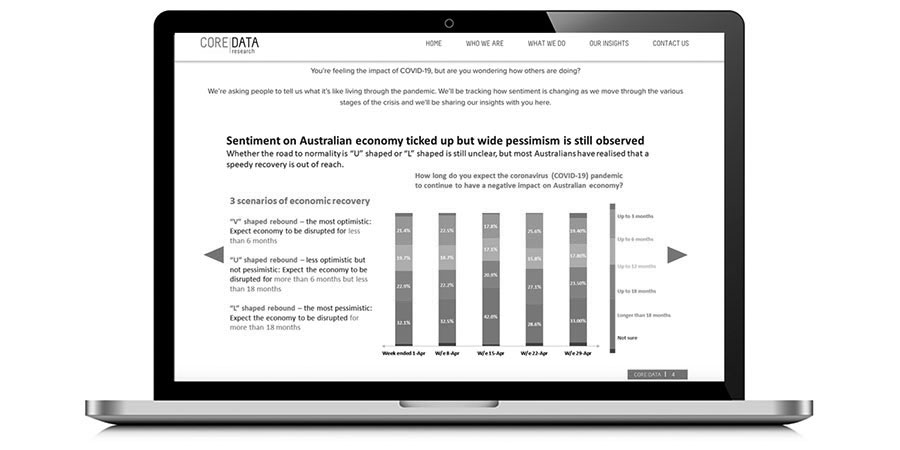
There’s no doubt the Federal Government’s stimulus package has provided a much-needed financial boost to many Australian households. In fact, recent research from CoreData suggests it’s had a direct impact on the level of “bill stress” being experienced.
In mid-April, CoreData’s COVID-19 Pulse Check highlighted a spike in the number of households reporting a financial position indicative of bill stress (being either uncertain they could, or were currently unable, to pay their bills). The number reporting that their financial position was not great, suggesting they were at risk of falling into bill stress, was also growing.

Declining bill stress coincides with Government stimulus measures
In recent weeks, there has been a promising reversal in these trends, with the timing coinciding with commencement of stimulus payments targeting recipients of several income-support payments, including Age and Disability Support Pensions and Jobseeker. With more people becoming eligible for Jobseeker payments and the partner income thresholds for these increasing, this week’s wave of research showed the biggest decline yet in Australians reporting household bill stress, now just 5.9 per cent, less than in late March (7.9 per cent) and down from a peak of 12.3 per cent just three weeks ago.
Supporting Australians to avoid or escape bill stress is critical for more than just the broader economy. More than three in five Australians (60.8 per cent) experiencing bill stress have now told us COVID-19 has resulted in them being unable to afford essentials like groceries. This obviously impacts wellbeing and mental health, with those experiencing bill stress continuing to report feeling anxious (29.2 per cent), overwhelmed (23.9 per cent) and depressed (22.5 per cent), with the depression rate far higher than among those in better financial positions.
The story is not as positive for those at risk of falling into bill stress however.

While the number of Australians in this bracket has remained relatively stable, accounting for 21.0 per cent of respondents in our latest research wave, we are seeing evidence of things changing for them, and not in a good way.
Perhaps most concerningly, a growing number of these Australians are actually reporting that they have experienced inability to pay household bills due to COVID-19. Where just 8.3 per cent of those in a financial position that put them at risk of bill stress said they had been unable to pay bills in late March, this week we saw that number soar to 26.9 per cent.
In addition, there has been a similar leap in the number of those at risk of bill stress telling us COVID-19 has resulted in them being unable to afford essentials like groceries. This week we heard that 26.5 per cent had experienced this, up from just 9.7 per cent in late March.
Are those at risk of bill stress next in line for help?
These findings throw up a few possibilities, as to why these Australians may be seeing their financial positions sliding. If they were earning enough before COVID-19 to not be receiving any income-support payments, they would have been ineligible for the initial stimulus payments that appear to have help those in more dire financial positions. Alternatively, they may be newly eligible for JobSeeker, but stuck in the backlog of applications, with Centrelink reportedly processing 21 times the usual number of JobSeeker claims. There will also be those who are not, or have not been able to put enough away for what has been much more than just a rainy day (just 43.6 per cent told us this week they have personal savings, and more than one in three, 34.3 per cent have no financial safety net at all) and now have no contingencies left.
Hopefully at least some of the Australians teetering on the edge of serious financial stress will see relief in the coming weeks, as they start to receive JobSeeker or JobKeeper payments (the latter rolling out from May 6), and more become eligible to do so. Challenges will remain for those whose personal or household income over the financial year to date leaves them ineligible for payments, or who work for employers ineligible for JobKeeper support.
Keep track of the impact of COVID-19 on the finances and wellbeing of Australians via our interactive dashboard here. From there, you can also share your own experiences, and contribute to the evolving story of the Australian experience of the COVID-19 pandemic.

